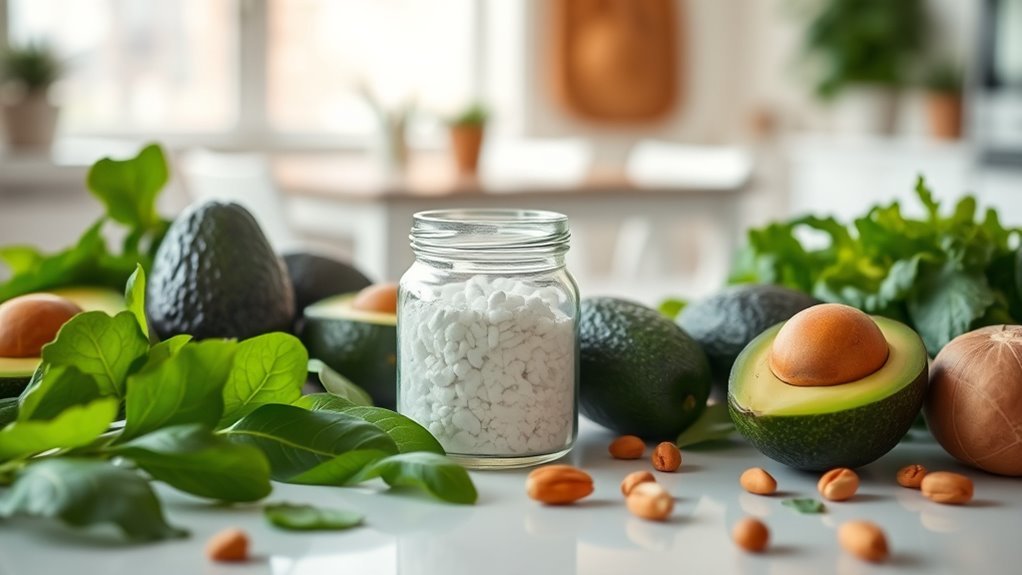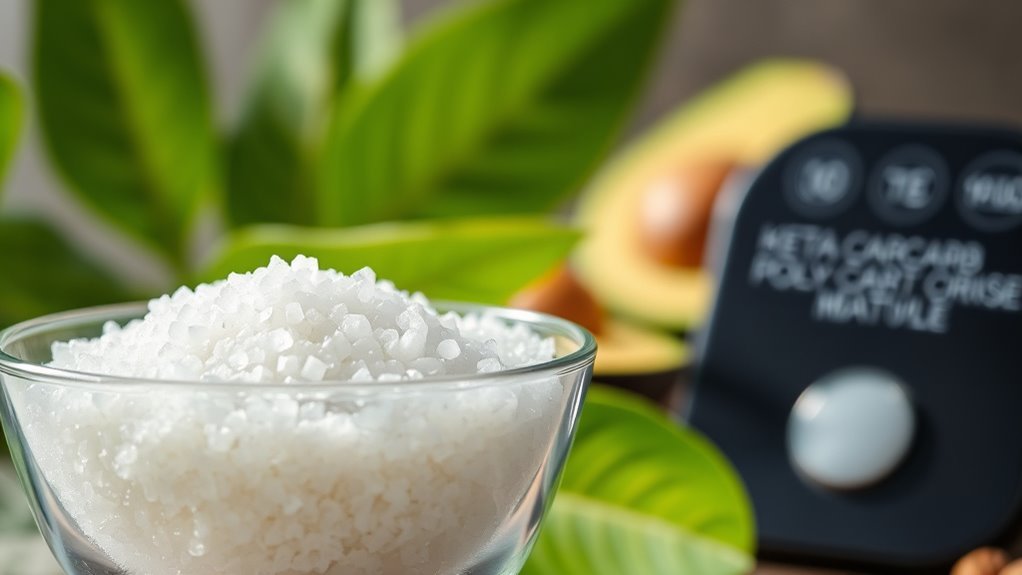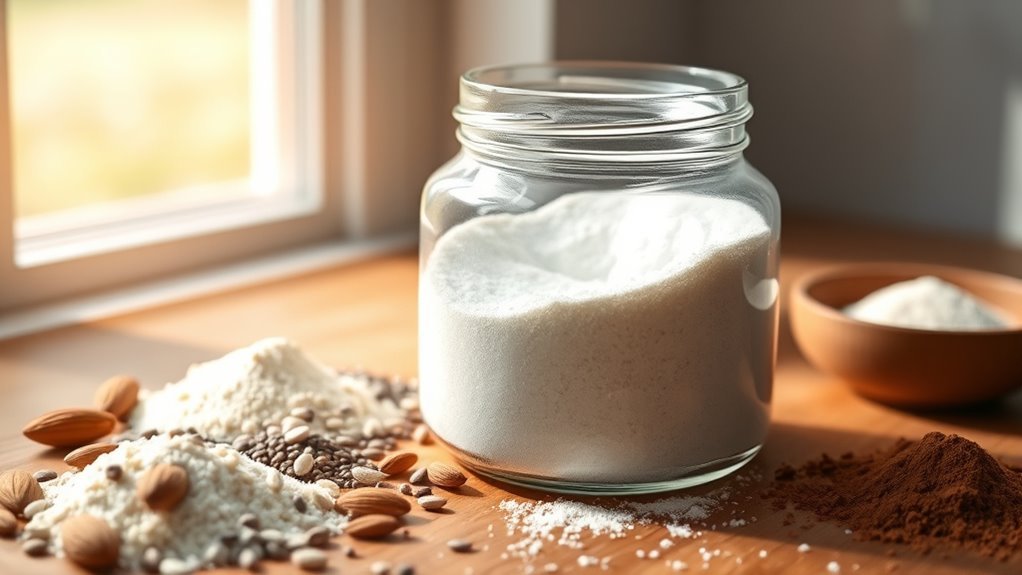Yes, polydextrose is keto-friendly. It’s low in calories and contains about 1 gram of net carbs per serving, making it suitable for a ketogenic diet. With a low glycemic index, it won’t spike your blood sugar or greatly impact insulin levels. This synthetic fiber not only adds bulk to low-calorie foods but also promotes digestive health. If you want to know more about its benefits and uses, there’s plenty more to explore.
What Is Polydextrose and How Is It Used?

Polydextrose is a synthetic polymer made from glucose and sorbitol, primarily used as a food additive. You might encounter it in various processed foods, where it serves multiple purposes. One of the most common polydextrose uses is as a bulking agent, which helps improve the texture of low-calorie and sugar-free products. It’s also utilized to enhance fiber content, making it a popular choice in health-oriented snacks. Polydextrose applications extend to beverages and dairy products, where it can stabilize emulsions and improve mouthfeel. Additionally, because it’s low in calories and has a minimal impact on blood sugar levels, it’s increasingly found in products marketed towards those seeking healthier dietary options.
Nutritional Profile of Polydextrose

When considering the nutritional profile of polydextrose, it’s important to note that this additive is low in calories, typically providing about 1 calorie per gram, which is markedly less than traditional carbohydrates. Polydextrose offers several nutritional benefits, primarily as a soluble fiber source. Here are three key points to keep in mind:
- Low-Calorie Content: Polydextrose’s low-calorie nature makes it a popular choice for weight management.
- Dietary Fiber: It contributes to dietary fiber intake, promoting digestive health and aiding in satiety.
- Blood Sugar Management: Due to its low glycemic index, it can be a suitable option for those monitoring blood sugar levels.
Incorporating polydextrose into your diet can provide these advantages while keeping calorie intake in check.
Polydextrose and Its Impact on Blood Sugar Levels

When considering polydextrose, it’s important to look at its glycemic index and how it affects your blood sugar levels. Research shows that polydextrose has a low glycemic index, which means it typically causes a minimal increase in blood sugar. Additionally, it can influence insulin response, making it a relevant option for those monitoring their glucose levels.
Glycemic Index Considerations
Although many people on a keto diet are concerned about their carbohydrate intake, understanding the glycemic index (GI) of a food can provide valuable insights into its impact on blood sugar levels. Polydextrose has a low GI, which means it’s less likely to cause spikes in blood sugar. Here are a few key points to ponder:
- Low Glycemic Index: Polydextrose typically scores around 1-5 on the GI scale, making it a safe choice for blood sugar management.
- Fiber-like Properties: As a soluble fiber, it can contribute to satiety without greatly affecting blood sugar.
- Ingredient Versatility: It’s often used in low-calorie and sugar-free products, fitting nicely into a keto lifestyle while minimizing blood sugar fluctuations.
Insulin Response Effects
While many people on a keto diet focus on minimizing carbohydrate intake, understanding how polydextrose affects insulin response is essential. Polydextrose is a soluble fiber that can impact blood glucose levels differently than traditional carbohydrates. Research shows it has minimal effect on insulin sensitivity, making it a favorable option for those monitoring their blood sugar. Since it’s low in calories and has a low glycemic index, it doesn’t cause significant spikes in blood glucose. By incorporating polydextrose into your diet, you might experience stable energy levels without compromising your insulin response. This fiber can be a useful tool for maintaining ketosis while enjoying a variety of foods, allowing you the freedom to explore different flavors without sacrificing your goals.
Is Polydextrose Low in Carbs?
When considering whether polydextrose is low in carbs, it’s important to look at its carbohydrate content and how it impacts ketosis. You’ll find that polydextrose is typically low in net carbs, making it a potential option for those on a ketogenic diet. Additionally, comparing its nutritional profile with other low-carb alternatives can provide further insights into its suitability for your dietary needs.
Carbohydrate Content Overview
Polydextrose is often considered a low-carb option, making it appealing for those following a ketogenic diet. This synthetic polymer is derived from glucose and sorbitol, offering a unique carbohydrate source. Its fiber content is notable, as it acts similarly to soluble fiber, contributing to digestive health without spiking blood sugar levels. Here are some key points about its carbohydrate profile:
- Low Net Carbs: Polydextrose typically contains about 1 gram of net carbs per serving.
- High Fiber: It’s classified as a soluble fiber, which can help you feel full longer.
- Minimal Impact: It doesn’t notably impact insulin or glucose levels, making it suitable for keto dieters.
Incorporating polydextrose can help you maintain your carb limits while enjoying a variety of foods.
Impact on Ketosis Levels
As you explore options for maintaining ketosis, it’s essential to contemplate how polydextrose fits into your carbohydrate intake. Polydextrose is a synthetic polymer of glucose, often used as a low-calorie bulking agent. While it contains calories, it’s classified as a soluble fiber, which means it may not greatly impact your net carb count. This characteristic can be beneficial for those committed to carbohydrate restriction. Studies suggest that polydextrose has minimal effect on blood glucose levels, which is vital for ketosis maintenance. However, individual responses can vary, so it’s wise to monitor your ketone levels when introducing polydextrose into your diet. Ultimately, understanding its role can help you make informed choices that align with your keto lifestyle.
Nutritional Comparison With Alternatives
While many low-carb alternatives exist, polydextrose distinguishes itself due to its unique nutritional profile. It’s often used as a low-calorie sweetener and fiber source, making it appealing for those on a keto diet. When comparing polydextrose with other keto-friendly alternatives, consider the following:
- Carbohydrate Content: Polydextrose contains fewer net carbs, as it’s often classified as a fiber.
- Glycemic Index: It has a low glycemic index, which helps maintain stable blood sugar levels.
- Digestive Benefits: Polydextrose sources contribute to digestive health, unlike some other sweeteners that may cause discomfort.
Incorporating polydextrose into your diet can provide a satisfying way to enjoy treats while staying aligned with your low-carb goals.
Comparing Polydextrose to Other Sweeteners
When evaluating sweeteners for a ketogenic diet, it is essential to compare polydextrose with other options like erythritol and stevia. Polydextrose is a low-calorie, soluble fiber that can affect blood sugar levels differently than erythritol, which has a zero glycemic index. Erythritol is often preferred for its sweetness without calories, while stevia is a natural sweetener with no carbs. When considering polydextrose alternatives, think about your personal tolerance and how each option fits into your dietary goals. Sweetener comparisons reveal that while polydextrose can add bulk to foods, it may not provide the sweetness you seek. Ultimately, it’s about finding the right balance that aligns with your keto lifestyle and preferences.
Potential Health Benefits of Polydextrose
Polydextrose offers several potential health benefits that might appeal to those on a ketogenic diet. Significantly, it can enhance your gut health and provide digestive benefits, which are essential for overall well-being. Here are three key advantages:
Polydextrose is a valuable addition to a ketogenic diet, promoting gut health and enhancing digestive comfort.
- Promotes Healthy Gut Flora: Polydextrose acts as a prebiotic, supporting the growth of beneficial bacteria in your gut.
- Improves Digestive Regularity: It can aid in maintaining regular bowel movements, preventing constipation and promoting digestive comfort.
- Low-Calorie Fiber Source: With minimal calories, it helps you feel full without disrupting your macros, making it a smart choice for weight management.
Incorporating polydextrose into your diet may lead to improved digestive health while staying aligned with your keto lifestyle.
Incorporating Polydextrose Into a Keto Diet
To successfully incorporate polydextrose into your keto diet, it’s essential to understand how it fits within your daily macronutrient goals. Polydextrose is a low-calorie fiber that can help you maintain your carb limit while adding bulk to your meals. You can find various polydextrose recipes that create delicious, keto-friendly snacks, like protein bars or baked goods. When using polydextrose, keep in mind that it’s often classified as a non-impact carb, meaning it won’t greatly affect your blood sugar levels. Monitor your overall fiber intake, as too much can cause digestive discomfort. By being mindful and creative, you can enjoy the benefits of polydextrose without compromising your keto lifestyle, offering you the freedom to indulge in tasty, guilt-free treats.
Frequently Asked Questions
Can Polydextrose Cause Digestive Issues in Some Individuals?
Ever wondered why some foods just don’t sit right? For some individuals, polydextrose can indeed cause digestive discomfort. This synthetic fiber, while often deemed safe, isn’t without its caveats. If you have polydextrose sensitivity, you might experience symptoms like bloating or gas after consumption. It’s essential to listen to your body and consider moderating your intake of products containing polydextrose if you notice any adverse effects. Your digestive health is worth the attention!
Is Polydextrose Suitable for People With Diabetes?
Polydextrose can be suitable for people with diabetes when used wisely. Its low glycemic index means it won’t spike blood sugar levels, which is a significant benefit for diabetes management. Additionally, it may help with satiety and digestive health. However, it’s essential to monitor individual responses, as some might experience digestive issues. Always consult with a healthcare professional before incorporating new ingredients into your diet to make sure it aligns with your personal health needs.
How Does Polydextrose Compare to Fiber in the Diet?
Did you know that around 90% of Americans don’t meet their daily fiber intake? Polydextrose offers several benefits as a low-calorie bulking agent and can help increase your dietary fiber intake. While it’s not a complete substitute for traditional fiber sources like fruits and vegetables, it can still promote gut health and improve satiety. Incorporating polydextrose into your diet might be a useful strategy to enhance overall fiber consumption and support digestive wellness.
What Are the Side Effects of Consuming Too Much Polydextrose?
When it comes to polydextrose consumption, excessive intake can lead to gastrointestinal issues. You might experience bloating, gas, or diarrhea, especially if your body isn’t accustomed to dietary fibers. It’s important to moderate your intake to avoid these side effects. While polydextrose can offer benefits like improved gut health, overdoing it may counteract those positives. Always listen to your body and adjust your consumption accordingly to maintain digestive comfort.
Is Polydextrose Safe for Children and Pregnant Women?
When it comes to polydextrose safety, especially for children and pregnant women, caution’s key. Studies show that moderate consumption is generally safe, but you should always consult a healthcare provider first. You wouldn’t want to risk children’s health or your own during pregnancy. While some might tolerate it well, others may experience digestive issues. So, be sure to weigh the benefits against potential side effects before making any decisions. Your health matters!
Frequently Asked Questions about Polydextrose and Keto
1. What is Polydextrose?
Polydextrose is a synthetic polymer of glucose that is commonly used as a low-calorie bulking agent and dietary fiber in various food products. It is soluble in water and has a texture similar to sugar, making it a popular ingredient in low-calorie and reduced-sugar foods. Polydextrose provides a source of fiber, but it is not digested like traditional carbohydrates, which is why people on a keto diet often consider its impact on ketosis.
2. Is Polydextrose Keto-Friendly?
Yes, polydextrose is generally considered keto-friendly. It has a very low glycemic index, meaning it does not cause significant spikes in blood glucose levels. While polydextrose does contain some calories, it is often counted as a fiber, which can be subtracted from total carbohydrate counts in some keto diets. However, individual tolerance may vary, and it’s essential to monitor how your body reacts to it.
3. How does Polydextrose affect ketosis?
Polydextrose is not fully absorbed by the body, so it contributes minimally to net carbohydrates, making it unlikely to disrupt ketosis for most people. Since it acts more like a fiber, it can be included in a keto diet as long as total carbs remain within your daily limits. However, it is advisable to consume it in moderation, as excessive amounts may lead to digestive discomfort.
4. Are there any side effects of consuming Polydextrose?
Some individuals may experience gastrointestinal side effects when consuming polydextrose, especially in large quantities. Common issues include bloating, gas, and diarrhea, particularly for those who are not used to high-fiber diets. It is recommended to start with small amounts and gradually increase intake to assess your body’s tolerance.
5. Can I use Polydextrose in my keto recipes?
Yes, polydextrose can be used in various keto recipes as a sugar substitute or bulking agent. It works well in baking, smoothies, and desserts, providing sweetness and texture without significantly increasing the carbohydrate count. Just be mindful of the overall carbohydrate content of your recipes to ensure they align with your keto goals.
References
- https://www.ncbi.nlm.nih.gov/pmc/articles/PMC5452233/
- https://www.ncbi.nlm.nih.gov/pmc/articles/PMC5612770/
- https://ods.od.nih.gov/factsheets/Polydextrose-HealthProfessional/
- https://www.ncbi.nlm.nih.gov/pmc/articles/PMC6772285/
- https://www.sciencedirect.com/topics/agricultural-and-biological-sciences/polydextrose
- https://www.healthline.com/nutrition/polydextrose#what-it-is
- https://www.food.gov.uk/research/research-projects/the-health-effects-of-polydextrose
- https://www.thepaleodiet.com/what-is-polydextrose/


